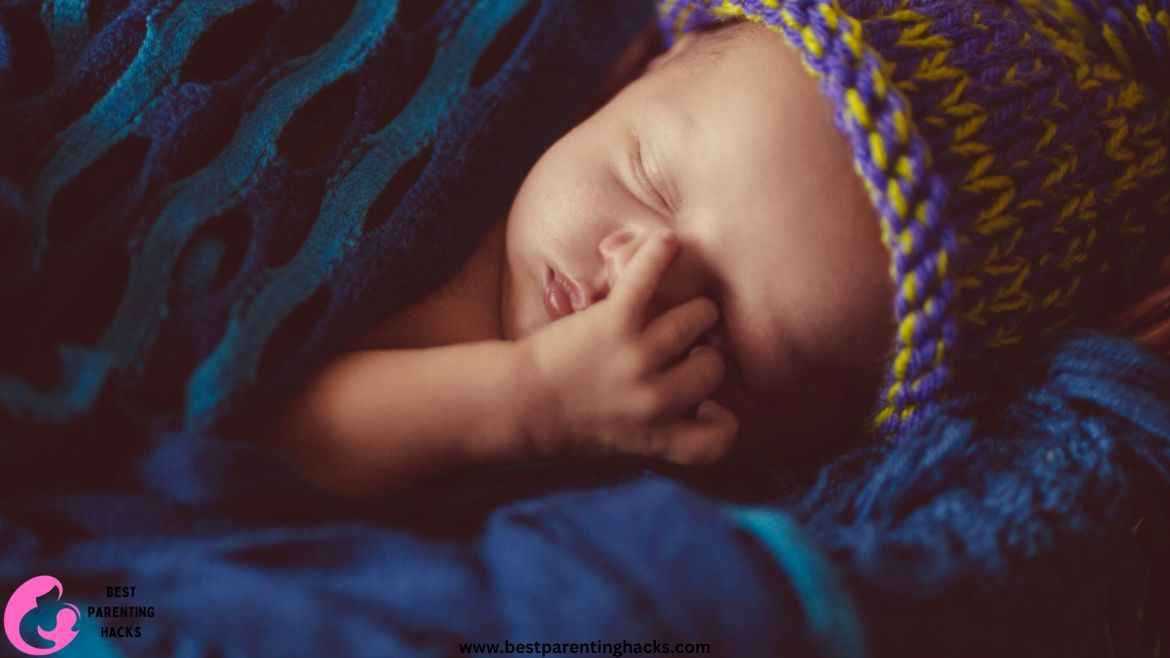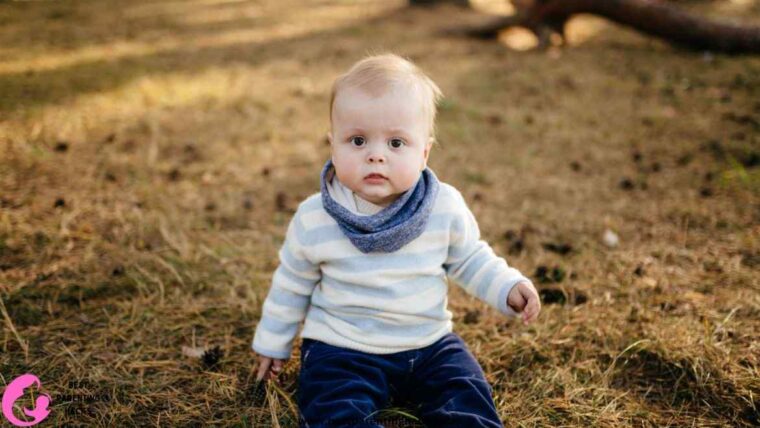Table of Contents
Watching your baby sleep is one of the most endearing and confusing sights for a parent. Any parent can experience an unfathomable sense of delight when they witness the innocence and tranquility that emanate from their small, sleeping figure. But when you discover your baby’s hands covering their face as they sleep, that excitement may soon turn to worry. This typical newborn behavior frequently leaves parents unsure about whether to take it as a sign of contentment or cause for alarm.
I know this because I’ve spent numerous evenings watching my infant sleep, and seeing their little hands cover their faces was both endearing and unsettling. One frequently asks themselves, “Why My Baby Covers Face with Hands When Sleeping?” The quick answer is that newborns do indeed frequently exhibit this behavior. However, any worried parent must comprehend the motivations for this behavior. Though this is usually a harmless reaction or a consoling gesture, it is important to understand the many components of this behavior to ensure both your baby’s safety and your peace of mind.
Understanding the Behavior
1. Moro Reflex in Babies Newborns exhibit the startle reflex, commonly referred to as the Moro reflex. A newborn may respond by throwing their arms out, clutching themselves, and occasionally hiding their face, if they sense that they are about to fall or hear a loud noise. This response normally goes away by the time the baby is 4 to 6 months old and is a natural part of their growth.
2. Fetal Position Comfort Babies are used to a relatively small area in the womb, where they frequently relax with their hands close to their faces in the fetal position. This posture provides comfort in addition to being an issue of spatial requirement. Babies may imitate this position in their sleep after delivery because it serves as a reminder of the safety and warmth of the womb.
3. Sensitivity to Light Light sensitivity is present in a baby’s eyes, particularly in the initial months following birth. It may be a normal reaction for them to cover their face with their hands in bright light or even throughout the day. They can control how much light they are exposed to when they sleep thanks to this.
4. Keeping Warm It’s difficult for newborns to control their body temperature. It may be their natural tendency to hide their faces in order to stay warm. Even if the infant may be responding naturally, it’s crucial to make sure they’re not overheated or in danger of suffocating.
You Might Also Like to Read: I Forgot To Give My Baby Vitamin D Drops. What should I Do?
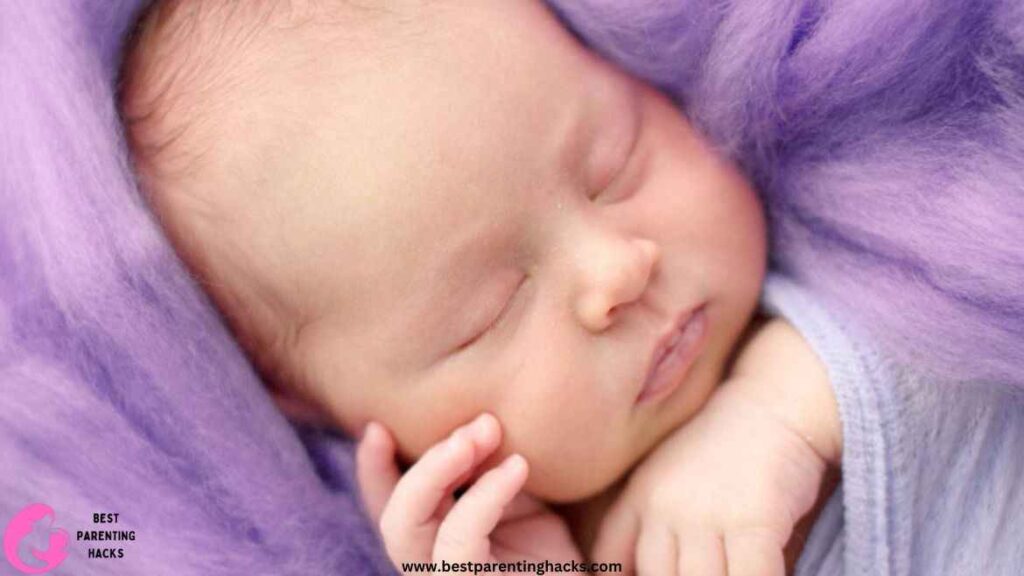
When to Be Concerned
1. Irregular Breathing Patterns See a pediatrician if your baby’s facial covering causes them to breathe irregularly or make strange noises like gasping or snorting. These could indicate breathing difficulties.
2. Frequent Awakening Your infant may be experiencing pain or breathing difficulties if they hide their faces while they sleep or wake up frequently.
3. Changes in Skin Tone Keep an eye out for any changes in your baby’s skin tone, such as a blue or very pale appearance, as these might be signs of oxygen deprivation.
4. Lack of Responsiveness When your infant covers their face and doesn’t react to light touches or noises, there may be a more serious problem going on.
5. Extended Periods of Face Covering While your baby’s occasional face covering is natural, it’s best to consult a doctor if your infant often sleeps with their face covered for prolonged periods.
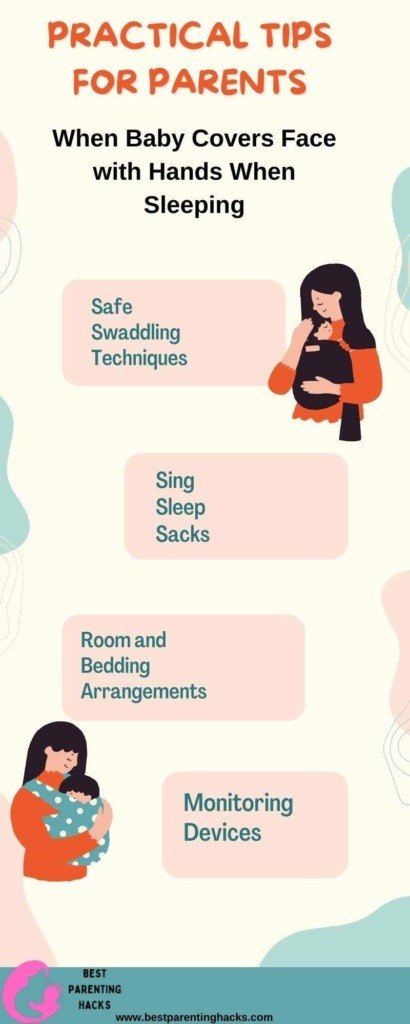
Practical Tips for Parents
1. Safe Swaddling Techniques Your infant may not hide their face if you swaddle them. Make sure the swaddle fits snugly without restricting hip mobility. Make sure the infant can breathe freely and avoid covering their head.
2. Sing Sleep Sacks When compared to blankets, sleep sacks are a safer option. Without running the risk of hiding their faces, they keep the infant warm.
3. Room and Bedding Arrangements Make sure the bedding is breathable and keep the room at a reasonable temperature. Make sure the crib is free of toys or loose blankets that the infant may snatch off and cover their face with.
4. Monitoring Devices To watch your baby while they sleep, choose a dependable baby monitor. For extra peace of mind, some monitors have cameras and motion sensors.
You Might Also Like to Read: I Dropped the Phone On My Baby’s Head. What Should I Do Now?
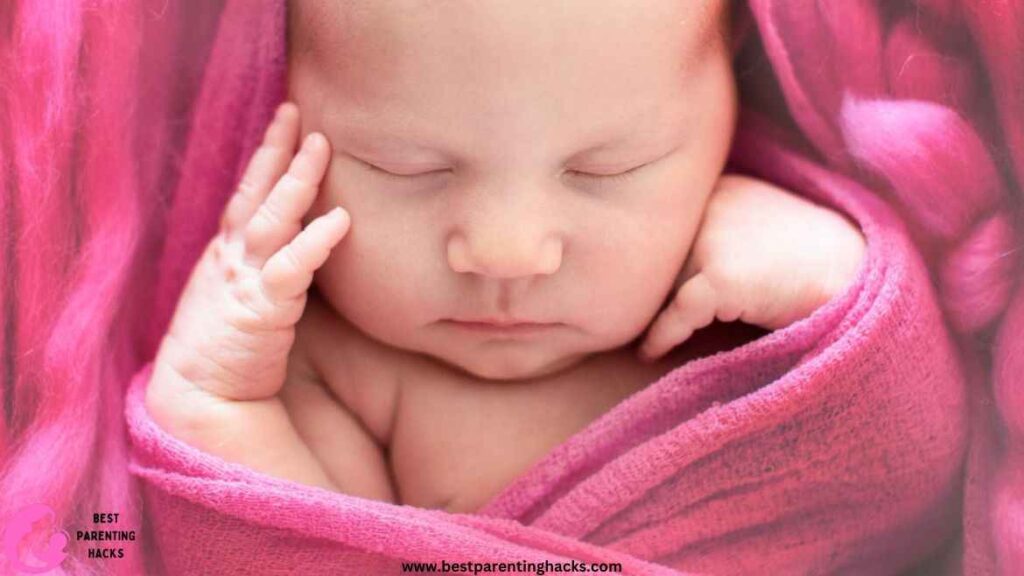
Expert Opinions and Advice
It can be difficult to navigate the nuances of newborn behavior, but professional advice and viewpoints can help worried parents. Here are four crucial actions to think about:
1. Pediatrician Insights A pediatrician should be seen on a regular basis not just for standard physical examinations but also to talk about developmental milestones and habits such as concealing one’s face when sleeping. With their extensive training in medicine and understanding of newborn behavior, pediatricians can provide valuable insights. They can offer you confidence about what’s typical and what isn’t, as well as advice suited to your baby’s individual needs. For example, they might advise if your baby’s propensity to hide their face is a passing phase or if it calls for more careful observation.
2. Sleep Specialist Advice In-depth analysis and remedies might be provided by a sleep specialist if your baby’s sleep habits are concerning. These professionals can assist in determining whether the behavior is being influenced by any underlying sleep disorders or developmental problems. They may also provide you with recommendations for safe sleeping methods so that your child can have a good night’s sleep without running the danger of being suffocated.
3. Latest Research and Guidelines It’s critical to keep up with the most recent findings and recommendations. Based on continuing research, health organizations update safe sleep habits regularly. These recommendations provide insightful advice on how to make your baby’s sleeping environment secure while lowering the hazards connected to certain habits, such as concealing one’s face. For instance, current recommendations advise against using soft bedding in the cot and favoring putting newborns to sleep on their backs.
4. Holistic Approaches Sometimes treating a baby’s sleep habit goes beyond treating its physical characteristics. Your baby’s quality of sleep may be greatly impacted by holistic methods, such as setting up a peaceful sleep environment or a peaceful bedtime ritual. Your baby may respond less restlessly to gentle bedtime routines like a warm bath or gentle lullabies, which can help indicate that it’s time for sleep.

Personal Experiences and Community Insights
Parents facing comparable difficulties might benefit greatly from the important support and useful guidance provided by personal experiences and community insights. Here are some advantages of sharing and picking up knowledge from others:
1. Sharing Personal As a parent, talking to people who had gone through similar things gave me comfort in sharing my worries and experiences. Talking to other parents about my baby’s practice of hiding their face as they sleep gave me insight into other viewpoints and coping mechanisms. Finding out that many other people had seen comparable habits in their newborns—behaviors that the babies eventually outgrew—was consoling.
2. Learning from Community Forums Parenting clubs and internet forums are veritable information gold mines. Parents from a variety of backgrounds share their special experiences and fixes here. Parents talked about the advantages of a specific baby monitor that warned them when their baby shifted into a problematic sleeping position, and how wearing a lightweight sleep sack made their infant feel safe without needing to cover their face.
3. Gaining Diverse Perspectives Interacting with a community facilitates the sharing of various viewpoints and advice. Finding the best method for your child might be aided by knowing that different babies have different experiences, even while what works for one baby may not work for another. To ensure their baby’s comfort, some parents, for instance, found success with certain swaddling techniques, while others chose to change the room temperature.
4. Emotional Support and Reassurance The emotional support and security that come from being involved in the community may be its greatest advantage. It might be immensely comforting to know that you’re not alone in your worries and that others have effectively overcome comparable difficulties. It fosters a sense of camaraderie and solidarity that is very helpful to parents navigating the highs and lows of having a child.
Conclusion
In conclusion, while it’s normal for parents to be concerned about their sleeping infant concealing their face, it’s important to recognize the causes of this behavior and know when to raise concerns. You can protect your peace of mind and your baby’s safety by putting these useful recommendations into practice and consulting professionals. Keep in mind that each infant is different, so what suits one might not suit another. As a parent, follow your gut and don’t be afraid to ask for assistance when necessary.
FAQs
1. Why does my infant sleep with their hands covering their face? It’s frequently a reflex, either to stay warm or for comfort because of light sensitivity.
2. Is it okay for my infant to sleep with their face covered? Although frequent, keep an eye out for any indications of discomfort or breathing problems.
3. How can I stop my infant from sleeping with their face covered? Using sleep sacks, making sure the bedroom is secure, and safe swaddling can all be helpful.
4. If my infant covers their face while they sleep, should I wake them up? It’s usually enough to gently reposition their hands without awakening them.
5. Can SIDS result from hiding one’s face? It may be a danger factor, but the risk is mitigated by using safe sleeping techniques.
6. Which baby monitors work best for seeing if the child is covering their face? Having a monitor such as the Owlet Cam provides both clarity and comfort.
7. At what point should I discuss this conduct with a doctor? See a pediatrician if the child exhibits indications of respiratory difficulties, wakes up often, or if the behavior appears out of control.

